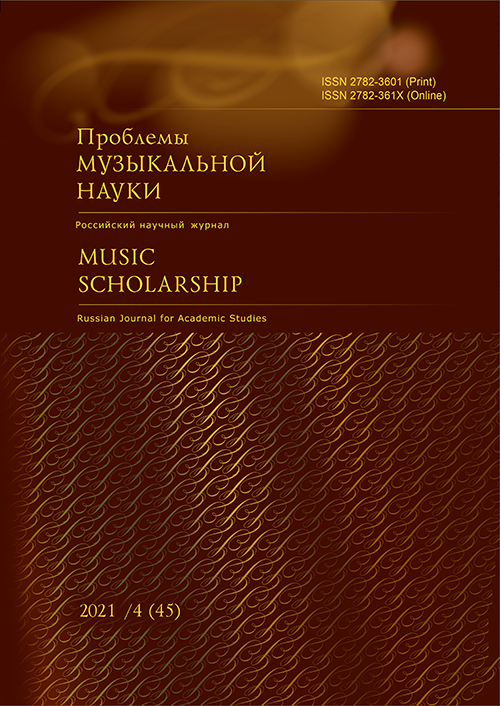Aesopian Language in the Music of the Theresienstadt Prisoners
Main Article Content
Abstract
The study of the phenomenon of “repressed music” of the Third Reich is often associated with the search for subtle hints, secret signs, hidden messages, which together form a single sign system – the Aesopian language. Aesopian language in art is an invariable companion of totalitarian cultures. One of the striking examples of its active use was the music written in the Theresienstadt concentration camp.
In foreign musicology, this problem is reflected in a large amount of works, while in Russian studies of Aesopians, the language as a phenomenon of Western European music is still poorly understood. The author of this article, using the hermeneutic and musical-analytical method, relying on cultural, historical and biographical facts, examines various manifestations of the Aesopian language in the musical works of the Terezienstadt composers.
Imprisoned in the Czech castle Terezin, four composers of Jewish origin – V. Ullmann, G. Klein, P. Haas and H. Krasa – captured in their works the spirit of resistance, bitter laughter over the world, and difficult personal tragedies. Their addressees were different: close friends and relatives (“Al s’fod” by P. Haas), prisoners of Theresienstadt (Passacaglia and fugue by H. Krasa), Slavs and Jews (“Four songs on the words of Chinese poetry” by P. Haas, Sonata No. 7 by V. Ullmann), contemporaries and descendants (G. Klein՚s String Trio). Composers cleverly maneuvered, hiding with the help of language “screens” “signs-signals” and “signs-contradictions”, which were understandable only to a limited circle of listeners. Thus, music became for them the most important means of communication, a way of inner liberation.
Keywords: Aesopian language, Theresienstadt, repressed music, Victor Ullmann, Gideon Klein, Pavel Haas, Hans Krasa.
Article Details

This work is licensed under a Creative Commons Attribution-NonCommercial-NoDerivatives 4.0 International License.
Copyright
The rights on the results of intellectual activity and equated means of individualization are protected in accordance with Part IV of the Civil Code of the Russian Federation. The authorship, author's name, executor’s name, inviolability of the work and result of execution are protected by the rules of Part IV of the Civil Code of the Russian Federation of the author or executor, regardless of providing legal protection of such results of intellectual activity at the time of their forming.
Copyright laws regulate the civil legal relations for using works of science, literature and art. Such relationships are formed as the result of the author’s writing his or her texts. In this case the author can rightfully claim copyright of the work.
The author has certain rights to reuse the work (see: “Ethical Aspects in Terms of Multifold Publications).
Licenses
All copyrights on the articles belong to their authors. The author transfers the rights on using the article the publisher.
PDF versions of scholarly articles of the journal PMN are published by using the license Attribution Non-Commercial No Derivatives cc by-nc-nd, allowing loading and distributing works on the assumption of indicating the authorship. The works may not be changed in any way or used for commercial interests.
Criteria for Authorship, Co-authorship
The term “author” refers to all persons (co-authors) who have made a substantial contribution to conducting the research and creation of the manuscript and responsible for its content. The person (author) who has submitted the manuscript to the editorial board shall bear responsibility for the complete list of the group of authors and the changes made to the manuscript in accordance with the results of the peer reviewing and editing.
1. Authorship is based on the following criteria:
1) The author made a substantial contribution to the research activity and development of concept, collected the data, made analysis and interpretation of the data.
2) The author carried out the writing of the text of draft articles and edited it attentively and substantially.
3) The author approved the final version of the article prior to its submission.
4) The author bears responsibility for the integrity of all parts of the manuscript.
2. The authors shall guarantee that the submitted manuscript is the original work.
3. Scholarly reviews for some issue or other should be objective, present material in a wide range and at the same time take into account the views of the author of the review.
4. The authorship of scholarly publications is obligated to reflect accurately the contribution of individuals to the research activity, with specific information about the authors.
5. The authors may not mislead the readers by publishing acknowledgements of gratitude to people who were not actually involved in writing the work. Other persons who made contribution to the work, but are nevertheless not the authors, may be listed in the rubric of “Acknowledgements,” with indications of the type and extent of their activities.
6. Authors are obligated to provide a description of their contribution to the publication.
7. The order of authorship must be a joint resolution of co-authors. The authors should be ready to explain the order of their enumeration and listing.
8. The authors shall be entirely responsible for the correct definition of authorship acting in accordance with the rules adopted in their institution.
9. Investigators must ensure that only those persons who meet the criteria for authorship (that made a significant contribution to the work), shall be considered the authors, and the researchers who do not merit authorship will be excluded from the list of authors.

